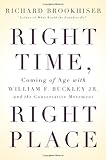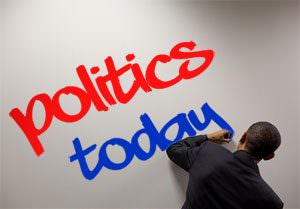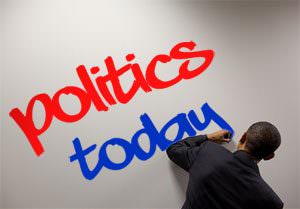Words From the Right: On Buckley and From Paul and Breitbart
As Campaign 2012 looms large, it's not exactly clear who or what will define the moment for conservatives -- has the Tea Party Express run out of steam? Who will emerge as their rightful leader? These three reads give us some idea of where they've been and where they might be headed.As Campaign 2012 looms large, it's not exactly clear who or what will define the moment for conservatives -- has the Tea Party Express run out of steam?
Richard Brookhiser’s bracing memoir, “Right Time, Right Place: Coming of Age With William F. Buckley Jr. and the Conservative Movement,” was originally published in 2009. Upon rereading it in paperback, it seems as if almost as much time had passed in the conservative movement over those two years as had passed between 2009 and 1978 when, at age 23, Brookhiser became National Review’s youngest senior editor.
There is very little mention of Barack Obama (only four times) and none at all of the economic collapse at the end of 2008, and thus no discussion of whether or not conservatives should take any responsibility or accountability for it. For that matter, there is surprisingly little about George W. Bush himself, except for an early boast that “the conservative movement helped elect presidents from Richard Nixon to Ronald Reagan to George W. Bush.” There is no discussion about whether or not conservatives should distance themselves from the Bush failures, as conservatives in the tea party most certainly have tried to do.
The main focus is on the glorious years just before the election of Reagan in 1980. The opening quote, from Wordsworth, says it all: “Bliss was in it that dawn to be alive, but to be young was very heaven!”
Right Time, Right Place: Coming of Age with William F. Buckley Jr. and the Conservative Movement
By Richard Brookhiser
Basic Books, 272 pages
Liberty Defined: 50 Essential Issues That Affect Our Freedom
By Ron Paul
Grand Central Publishing, 352 pages
Righteous Indignation: Excuse Me While I Save the World!
By Andrew Breitbart
Grand Central Publishing, 272 pages
Some might argue that Brookhiser, who in 1969 at the age of 14, wrote a cover story for National Review, the magazine Buckley edited for 25 years, was a little too young to have witnessed the glory years. Those a few years older might want to consult Buckley’s “Flying High: Remembering Barry Goldwater.” Anyway, you can’t fault Brookhiser for his enthusiasm: “William F. Buckley Jr. (1925-2008) changed the world. I was at his side during the years the world noticed it. George Will once said, ‘Without Buckley, no National Review; without National Review, no conservative takeover of the Republican party; without that, no Reagan; without Reagan, no victory in the Cold War.’ ” When Buckley died, “He was treated as a fallen head of state.”
Some 30 to 35 years earlier, “There was a conservative movement which might loosely be defined as Bill Buckley’s admirers and National Review’s readers, self-aware, ideological. …” If the general public did not understand how important Buckley and National Review were to Reagan’s ascendancy, Reagan himself certainly did. After his victory over Jimmy Carter in 1980, NR splurged on a big ad in The New York Times which featured a picture of Reagan reading the magazine. The tag line read, “I got my job through National Review.” The 1980 election, writes Brookhiser, “was like getting the keys to the kingdom.”
Brookhiser’s account of the growth of conservatism in the Reagan era seems nostalgic. Back then most of the figureheads of the conservative movement were concentrated in the Northeast; many were old, moneyed WASPs or, like Buckley, from wealthy Catholic families. But having won the White House, they were now forced to let in the unwashed barbarians from the suburbs of the nation: “Even as National Review was changing, so the Right was changing around it, taking on new recruits. The Reverend Jerry Falwell, pastor of a mega church in Lynchburg, Virginia, began to mobilize and politicize evangelicals. Everyone thought they had disappeared with the Scopes trial. …” I don’t think that Brookhiser has any idea how condescending this sounds. But let’s move on.
Buckley “defended the evangelicals from their cultured despisers, even though they were a new thing in his experience. The religion of the Right, especially his part of it, had been Catholicism. At the high end of polemics, Catholics drew on [Evelyn] Waugh and G.K. Chesterton, ultimately on Aquinas. At the low end they engaged in trench warfare.” One suspects that these cultured despisers whom Buckley defended these new soldiers against weren’t just liberals but many in his camp, and it’s easy to imagine that they were horrified at the thought of having to share their hard-won power with millions who couldn’t read a lick of Latin.
“I found evangelicals alien but interesting, roots music for white protestants,” Brookhiser writes with the kind of sniff more appropriate to a British anthropologist observing the Irish. “Neoconservatives struck me as forbidding, unfunny, and too apt to take credit for thoughts that we at National Review had thought years earlier.” It sounds to me that what Brookhiser means is that once these damn rednecks were handed the keys to the kingdom they wouldn’t take orders from him and his Ivy League pals.
In retrospect, it’s amazing that the National Reviewers could not have understood that the foot soldiers, once the doors were open, would overwhelm the palace guard and take over the kingdom. “National Review was discovering whole new tracts of America” — how jolly decent of them — “even as they [the evangelicals] were discovering the conservative movement.” I don’t think these people were “discovering” the conservative movement at all but operating on principles they regarded as conservative that were older and, shall we say, more fundamental than anything expressed in the pages of National Review.
How genteel Brookhiser sounds when he writes that “Things change politically, we believed, only though the force of ideas, and ideas got their dry runs in places like National Review.” But in a very short time the people taking over the show would be getting their ideas from preachers pushing their interpretations of the Old Testament and, just a few years after that, from an Internet where rumors were treated as fact. After a couple of short decades, it is questionable whether or not ideas, in the sense that William Buckley and his followers had known them, matter at all to conservatives.
Brookhiser passes on those ideas, such as they were, as summed up by the founder of The American Spectator, Bob Tyrrell: fight communism, cut taxes, the pieties. Those three credos are pretty much the essence of Reaganism. Communism is gone, which leaves the last two. Regarding the pieties, family values have pretty much been reduced to opposing gay marriage, a position that is losing support almost daily, and abortion, no matter how much it fires up certain segments of the right, will simply not carry a campaign. This leaves the Republicans with just one issue that they can all line up behind: cutting taxes. The problem is that since Reagan, that has increasingly meant cutting taxes for the rich — which as we head into the summer of 2011 is threatening to implode on the right.
Back in the 1970s, Ron Paul was, as Brookhiser reminds us, “a doughty Reaganite.” After 40 years of politics, Paul desperately tries to sway Reagan’s remaining followers in the libertarian direction. But “Liberty Defined: 50 Essential Issues That Affect Our Freedom” contains a great deal of fuzzy thinking — Paul isn’t exactly Robert Nozick when it comes to defining libertarian theory — and is as uninspiring a writer as he is a speaker. Essentially, Paul cherry-picks quotes he likes from the Founding Fathers (like many libertarians, this mostly means Jefferson), Ayn Rand and economists from “The Austrian School” (particularly Ludwig von Mises). He doesn’t really attempt to define or articulate their philosophies; he simply ignores the contradictions and keeps what he likes.
For instance, he champions “the work of private institutions such as the Ludwig von Mises Institute to show that the Austrian paradigm makes more sense of the way the world works than the bundle of fallacies that characterize the Keynesian system.” I don’t know about the way the world works, but Mises showed us how one side of the conservative mind worked, particularly in his letters. Here’s a passage from one he wrote to Ayn Rand, which Paul neglected to include: “You have the courage to tell the masses what no politician told them: You are inferior, and all the improvements in your condition which you simply take for granted, you owe to the effort of men who are better than you.” I’d say this was a tad elitist for those masses that Paul is trying to reach in televised Republican presidential debates.
Right Time, Right Place: Coming of Age with William F. Buckley Jr. and the Conservative Movement
By Richard Brookhiser
Basic Books, 272 pages
Liberty Defined: 50 Essential Issues That Affect Our Freedom
By Ron Paul
Grand Central Publishing, 352 pages
Righteous Indignation: Excuse Me While I Save the World!
By Andrew Breitbart
Grand Central Publishing, 272 pages
“Liberty Defined” is a collection of short essays on topics ranging from abortion to Zionism, many of which I would think a libertarian who wanted to succeed in politics would be well advised to avoid. For example, on abortion we are “overstepping the bound of morality by picking and choosing who should live and who should die.” This is tricky from the outset: Whose morality are we talking about? A morality derived from libertarian ethics? And if so where are the analysis and debate? Or are we talking about Paul’s own personal morality? The latter, it would seem. And if that is indeed the case, why should his morality be more of a guidepost than anyone else’s — or any other libertarian’s?
Then he digs himself in even deeper: “The only issue that should be debated is the moral one: whether or not a fetus has any right to life. Scientifically, there’s no debate over whether the fetus is alive or human. …” Scientifically, there’s a huge debate over precisely what Paul treats as an assumption, and his failure to address that entirely undercuts the moral underpinnings of his argument. Later, though, we get to what seems to be the crux: “If we are ever to have fewer abortions, society must change again. The law will not accomplish that. However, that does not mean the states shouldn’t be allowed to write laws dealing with abortion.” The willingness of some libertarians to take power away from “The State” only to hand it over to “the states” makes me queasy; what difference does it make whether a large or small government takes a right or freedom away from you?
Here are some other issues from “Liberty Defined,” as I came across them:
— Slavery. “We are not shy about saying it: slavery is immoral.” We are with him 150 percent on this one.
— Gun control: “History shows us that another tragedy of gun laws is genocide. Hitler, for example, knew well that in order to enact his ‘final solution,’ disarmament was a necessary precursor.” Does Paul really believe that millions of Jews were rounded up and sent to death camps because they gave up their handguns and deer rifles?
— Global warming: “Crucial to this whole scheme has been the voice of radical environmentalism. Many of these people simply do not desire economic progress.” As in his abortion argument, Paul simply assumes that arguments to the contrary are false and the result of bad faith by their proponents. Isn’t it possible that some environmentalists do desire economic progress but don’t think they’ll find it when the water is up to their necks? (Why, I wonder, are so many conservatives determined to blur the fact that the root of the words conservative and conservation are one and the same?)
“There are many,” he says, “who have been influenced by the false science. Only good science can refute this.” But as with his elusive definition of morality, one is hard-pressed to determine how exactly one discerns false science from good science; apparently it is not by reference to scientists themselves, nearly 95 percent of whom believe global warming is real. Good scientists, Paul seems to think, are those who believe that the free market should decide the issue.
— Racism: “I really don’t know what is worse: the actual sponsorship of racism by the government itself in war time or the support of ‘affirmative action and quotas’ in the name of ending racism.” I do — it’s the first one.
— States’ rights: “It’s not just an academic discussion; it’s a serious practical debate on how we got ourselves into such a mess and whether or not the federal government is about to implode with an unbearable debt burden.” Yes, we are in a mess, and one of the reasons the federal government is burdened with such debt is that it takes money from the states such as the one I live in, New Jersey, and gives it to numerous states that spend considerably more money than they take in, including Kentucky, where his son Rand is a senator. One of the easiest ways to pay off the national debt would be to stop funding these welfare states and let them be sovereign by paying their own bills. But that’s not a solution that Paul even mentions.
— Taxes: “As long as people believe the nonsense that taxation is a blessing and any objection to it means opposition to civilized society … we will see a continued decline of civilization.” Now wait a minute: Who in his or her right mind has ever maintained that taxation is a blessing? Isn’t this called setting up a straw man?
— Evolution versus creationism: “One of the silliest questions posed to the Republican presidential candidates in 2008 dealt with evolution. Why should an individual running for the presidency of the United States be quizzed as to whether or not he or she believes in evolution? The question was designed in an attempt for the supporters of evolution to embarrass a candidate who supports creationism. …” I agree that the question is ridiculous and that there’s no reason why someone running for president should be asked it. But Paul is being disingenuous to the point of dishonesty if he pretends he doesn’t know why that question was asked. It was asked because a mass of people who vote Republican consider creationism an important political issue. Why pretend otherwise? It wasn’t the Democrats who came up with politicized creationism. Sorry, but I regard creationism as pseudo-intellectual nonsense, and if anyone running for president is either silly enough to say he believes in it or hypocritical enough to say it in order to suck up to potential voters, I want to know.
— On economic recovery: “Unbelievably, I hear talk in Washington that the only way to get us out of deep recession or depression is to get us into a war as FDR did.” And so the right wing comes back around to the old “FDR maneuvered the Japanese into attacking us at Pearl Harbor” theory. (At least Paul seems to think that FDR did get us out of the Great Depression.)
And so on. You can flip to just about any page in “Liberty Defined” and find something that could be used to start a sour, unwinnable argument with someone who isn’t predisposed to Paul’s way of thinking.
“The Civil War,” he writes, “was fought to keep all states under the thumb of a powerful central government.” No, it wasn’t. It was fought because states that owned slaves were afraid that states that didn’t have slaves were going to outnumber them in Congress, so they banded together to go to war — and they weren’t shy about saying beforehand that they were doing so in defense of slavery.
“We are policed everywhere we go: work, shopping, home, and church.” We most certainly are not, and people who are held up going to work or in shopping mall parking lots might argue that we could use a few more police.
“Nothing is private any more … not even our houses of worship.” Indeed they aren’t private — many of them have become untaxed corporations.
And, finally, on bipartisanship: “When it comes to any significant differences … both parties are very much alike.” And, “Bipartisanship will not help … mainly because there are so few things on which the two parties agree. …” Wait, what? I thought the parties are very much alike. Which is it?
Right Time, Right Place: Coming of Age with William F. Buckley Jr. and the Conservative Movement
By Richard Brookhiser
Basic Books, 272 pages
Liberty Defined: 50 Essential Issues That Affect Our Freedom
By Ron Paul
Grand Central Publishing, 352 pages
Righteous Indignation: Excuse Me While I Save the World!
By Andrew Breitbart
Grand Central Publishing, 272 pages
Surely the two parties can’t be that much alike, if only because only one of them is very, very angry. But exactly what it is so angry about?
“As a New Media addict,” says Andrew Breitbart in “Righteous Indignation: Excuse Me While I Save the World!,” “I am both junkie and supplier.” The junk, it would appear, is pure anger laced with paranoia. When Paul Krugman coined the term “the angry rich,” it’s difficult to believe he didn’t have Breitbart in mind.
With Breitbart, the last vestiges of the classic conservatism of Buckley and National Review are gone; he doesn’t engage his opponents in debate or even bother to define the boundaries of the discussion. The enemy is simply anyone who can be counted as the left. “The left,” he writes, “is the media.” He repeatedly equates the “mainstream media” with “left media,” so often, in fact, that one wonders why he bothers to use the term mainstream media at all, and the left media would appear to be anything to the left of him — which leaves a huge amount of media in the category of left.
For Breitbart, a vast territory is involved: “when the Soviet Union disintegrated, the battle simply took a different form. Instead of missiles, the new weapon was language and education, and the international left had successfully constructed a global infrastructure to get its message out.” Readers old enough to remember the farthest out of right-wing conspiracy theories, the “Communist-Catholic-Jewish One World” notion, might experience the warmth of recognition, but for Breitbart, owner of a series of conservative websites, the targets are closer to home. He “knew the fix was in [for the current president’s electoral victory] when Oprah Winfrey featured Obama twice on her mega-influential daytime show.”
Winfrey, in Breitbart’s scenario, almost seems like a character out of “The Manchurian Candidate.” After all, “any criticism of Obama, with his thin résumé and shadowy past, could be framed by a like-minded media class as racism, cowing dissent.” Of course. One sees it immediately. How could a supporter of half-term governor Sarah Palin such as Breitbart be accused of racism for talking about Obama’s “thin résumé”?
What other forces are to be found in the conspiracy? Apparently Columbia and Harvard, since Barack Obama rose through “the corrupt ranks of modern academia.” (Presumably Yale was not part of this corruption when George H.W. and George W. were shepherded through.)
Obama, Breitbart claims, achieved nothing on his own merits and owes everything to “a media and cultural system [constructed] to affirm liberal narratives [which] granted Obama a mega catapult to launch him in a way that no Republican or conservative could ever experience.” All it took for this system to kick in, apparently, was an eight-year stretch when the Republicans were in control and ran the economy right into the ground. In an article in The New Yorker last year, written before Breitbart achieved national fame in the Shirley Sherrod scandal, he was quoted as saying, “Obama’s election was the culmination of a plot set in place in the 1930s by émigré members of the Frankfurt School.” (One can almost hear the conversation when Adorno, Benjamin and Marcuse first met in Greenwich Village after coming to New York in 1935: “OK, first step of our plan successfully completed. Now we find the right Negro to run for president. …”)
If you buy a copy of “Righteous Indignation” to read an explanation of the Shirley Sherrod incident, you’ll be disappointed to find that Breitbart has little to say about it, commenting near the end of the book, “You probably know that Sherrod has threatened in the media to sue me.” Actually, she filed suit against him back in February for posting a video that had been selectively edited to make her appear racist in a speech she gave. If Breitbart had announced on Page 1 that he wasn’t going to deal with Sherrod, I might not have purchased the book. He does tell us, “I can say this: there’s a hell of a lot more to the Sherrod story than you’ve heard at this point. Stay tuned.” I can hardly wait; Breitbart, perhaps unwittingly, gave us a tantalizing preview on the April 29 episode of Bill Maher’s “Real Time” cable TV show when he said Glenn Beck “threw me under the bus” when Beck reported and commented on the Sherrod affair.
Whatever happens in court, events have already overtaken Breitbart the prognosticator. 2011, he tells us, “is going to be less about holding Nancy Pelosi and Harry Reed accountable than it’s going to be about holding George Stephanopoulos, Andrew Morse, ABC News, and the rest of the mainstream media [sic] accountable. … It’s going to be about holding Arianna Huffington and Christiane Amanpour and Contessa Brewer and Katie Couric and Pinch Sulzberger accountable.” Forget the rest — Katie Couric? How did she get to be included on Breitbart’s list of the liberal media’s power elite? By asking Sarah Palin what she reads? In any event, we’re almost halfway through the year and the only ones being held to account are the Republican candidates whom Breitbart favors. (Though, as this article is published, Ron Paul, against all odds, is hanging tough.)
Richard Brookhiser relates a story about a former National Review editorial assistant named Bob Mack who “was a Randian, though pleasant. After he left, he wrote a hatchet job on his former employer and place of work. The illustration said it all: it showed Bill [Buckley] in Mortimer’s, a clubby Upper East Side restaurant, a yachting cap askew on his head, his belly stouter than it was (though it was stouter than it had been), a glass of red wine tipped in his hand. Outside the window stood the next generation of would-be conservative leaders, noses pressed vainly against the glass. … Bill, said Mack, was tired, old, lazy, burned out. The truly consequential right-wing thinker of our time was the late Ayn Rand.”
It’s an ugly story, but I think Mack was ultimately correct. The real avatar of American conservatism was not Buckley or any of his acolytes or even the man Buckley helped become president, Ronald Reagan. Buckley and his writers will now fade further into the background of American political history until they are mere footnotes. As for Reagan, conservatism has moved so far to the right that if he appeared on the political scene today, those who call themselves conservatives would greet him with the same animus as Dostoyevsky’s Grand Inquisitor greeted Christ, pointing at him and yelling “Socialist!” just as they now do to Obama, whose policies, in many ways, resemble those of a moderate Republican of an earlier day.
But this is probably all academic. As Garry Wills once shrewdly observed, “The aftermath of Reagan’s presidency has proved, over and over, that Reaganism without Reagan is unsustainable. Even with him, it was a tottering edifice.” Reagan, Wills wrote, “gave conservatism the elements it had signally lacked — humanity, optimism, hope. … Reagan, without much wit or passion or intelligence, had a humanity that made up for anything he lacked.”
With Paul and Breitbart, the purest products of Randism (though Rand herself loathed libertarians, calling them “worse than the new left”), we get neither wit nor intelligence, and passion only if one equates it with anger. Humorless and as utterly lacking in irony as an Ayn Rand novel (or the recent, cheerless film of “Atlas Shrugged”), Paul and Breitbart are the greatest gift the Democratic Party ever could have received. With every succeeding week, they drive a wider wedge between the right wing and the American mainstream — the real mainstream, not Breitbart’s — with greater effectiveness than the Democrats ever could. Between them, they are succeeding in marginalizing conservatism.
Your support matters…Independent journalism is under threat and overshadowed by heavily funded mainstream media.
You can help level the playing field. Become a member.
Your tax-deductible contribution keeps us digging beneath the headlines to give you thought-provoking, investigative reporting and analysis that unearths what's really happening- without compromise.
Give today to support our courageous, independent journalists.












You need to be a supporter to comment.
There are currently no responses to this article.
Be the first to respond.